GEORGE CROSS FOOTBALL CLUB
1947 – 1957
HUMBLE BEGINNINGS
Whenever there was a gathering of Maltese migrants in 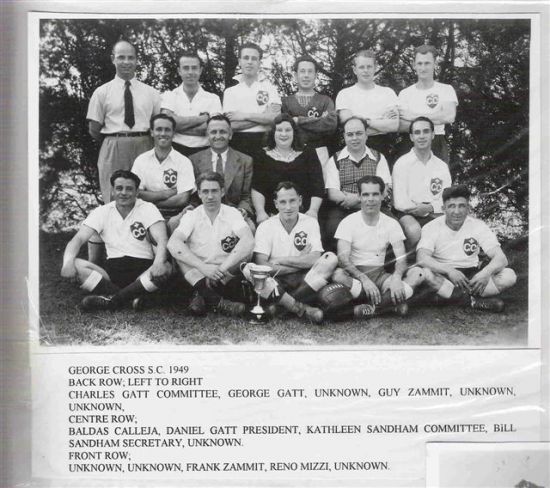 The following year they went one better when they won the third division championship to win promotion. Following 3 years in division two the club suffered a major set back when George Cross was relegated in 1952. The following season was another good one for the Cross when they won promotion back to the second division. 1954 was another magnificent year for the club with the team winning the championship to go into the first division. Reaching the highest level of competition after only 7 years surprised everyone at the club, and it showed on the field as George Cross came crashing back to earth to be relegated when the team finished last. 1956 was a big year for
The following year they went one better when they won the third division championship to win promotion. Following 3 years in division two the club suffered a major set back when George Cross was relegated in 1952. The following season was another good one for the Cross when they won promotion back to the second division. 1954 was another magnificent year for the club with the team winning the championship to go into the first division. Reaching the highest level of competition after only 7 years surprised everyone at the club, and it showed on the field as George Cross came crashing back to earth to be relegated when the team finished last. 1956 was a big year for
PROMINENT PLAYERS 1947-1957.
Baldasere Calleja, Guy Zammit, George Gatt, Reno Mizzi, Frank Zammit, Joe Doggett, Charles Camilleri, Joe Borg, Walter Buttigieg, Joe Gauci, Stan Stacey, Frank D’Amato, Eddie Zammit, Joe Debono, Danny Catania, Paul Zammit, Mose Cachia, Del Mannering, Vince Muscat.
The 1949 third division championship winning team
SECOND DECADE.
1958 – 1967
GEORGE CROSS A POWERHOUSE
1958 saw our club back in top flight and there was great determination by the club's administration to ensure the team remains with the best teams in this state by keeping all the players who won the previous years championship. The club recruited several good players to add depth to the squad. That season the first division became known as the State League and George Cross was proud to be one of the 12 foundation members of this new competition. The club did well to survive, but had some nervous moments before securing their State League status. The worst moment in 1958 came in the 12-0 loss to Hakoah. Enough said! The year ended on a high for the club, when the George Cross sponsored 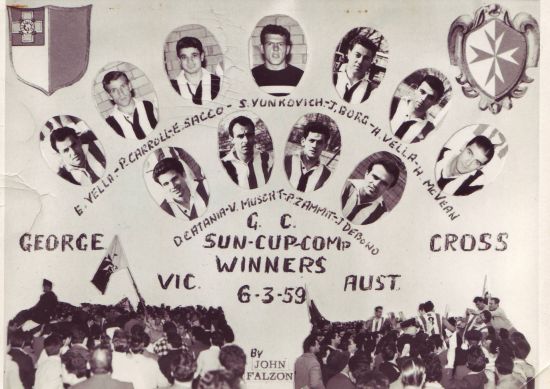 The following season saw George Cross Football Club become the glamour team of Victorian football. The team just failed to win the 1959 championship by coming a close second to Wilhelmina, but during the year the team won the triple crown, by winning the Sun Cup, the State League Cup and the Dockerty Cup. It was a great achievement and one that was celebrated big time by the thousands who were now following the club. In 1960 and 61 cups continued to come George Cross’ way, but in the race for the championship the team came second for the third season in succession. 1961 saw the club introduce Juniors for the first time. In 1962 the standard dropped a little with the team slipping down the ladder to finish in fifth place. There was however more rejoicing in cup competitions, when the club's name was inscribed on the Dockerty Cup for the second time. 1963 was a lean year by George Cross standards with no silverware coming the way of the club, but the team had a reasonable good year by finishing third in the league. 1964 it was second on the ladder yet again but supporters finished the year with huge smiles on their faces when the team beat A.PI.A from N.S.W. 3-2 to win the Australia Cup in front of 15,000 people at Olympic Park. It was the biggest achievement in the 17 year history of the club. That same season the reserves team won the championship for the second time following the 1961 success. The following year George Cross won the pre – season Ampol Cup beating Hakoah 3-0 in front of 10,000 fans in
The following season saw George Cross Football Club become the glamour team of Victorian football. The team just failed to win the 1959 championship by coming a close second to Wilhelmina, but during the year the team won the triple crown, by winning the Sun Cup, the State League Cup and the Dockerty Cup. It was a great achievement and one that was celebrated big time by the thousands who were now following the club. In 1960 and 61 cups continued to come George Cross’ way, but in the race for the championship the team came second for the third season in succession. 1961 saw the club introduce Juniors for the first time. In 1962 the standard dropped a little with the team slipping down the ladder to finish in fifth place. There was however more rejoicing in cup competitions, when the club's name was inscribed on the Dockerty Cup for the second time. 1963 was a lean year by George Cross standards with no silverware coming the way of the club, but the team had a reasonable good year by finishing third in the league. 1964 it was second on the ladder yet again but supporters finished the year with huge smiles on their faces when the team beat A.PI.A from N.S.W. 3-2 to win the Australia Cup in front of 15,000 people at Olympic Park. It was the biggest achievement in the 17 year history of the club. That same season the reserves team won the championship for the second time following the 1961 success. The following year George Cross won the pre – season Ampol Cup beating Hakoah 3-0 in front of 10,000 fans in
pointment with George Cross coming second for the 6th time in 8 season. The team was branded' ALWAYS THE BRIDES-
1959 TREBLE WINNERS. MAID, NEVER THE BRIDE’. 1966 and 1967 were very poor seasons for the club with the team slipping down the ladder and fighting to avoid relegation. It was only late season rallies that saw the Georgies hang on to their State League position. In 1967 George Cross moved to a new home ground in
PROMINENT PLAYERS 1958-1967.
Tony Vella, Lolly Vella, Edddie Sacco, Vince Muscat, Eddie Azzopardi, Steve Yuncovich, Alfred Abela, Joe Falzon, Hugh McVean, Bill Copeland, Pat McKenna, Paul Nelson, Norm Hobson, Don Hodgson, Alfred Falzon, Louis Sacco, Horst Zelienski, Archie Campbell, Marshall Gibb, Tony Cassar, Tom McPherson, John Brown, David Goldie, John McDaid, Bobby Adams, Hans Petersen, Bobby Mayle, Barry Horsfall, Willie Armour, Neil Morson, Tom Robertson, Bill McIvor, John Sanchez.
THIRD DECADE
1968 -1976
SEARCHING FOR A HOME
After the short stint at 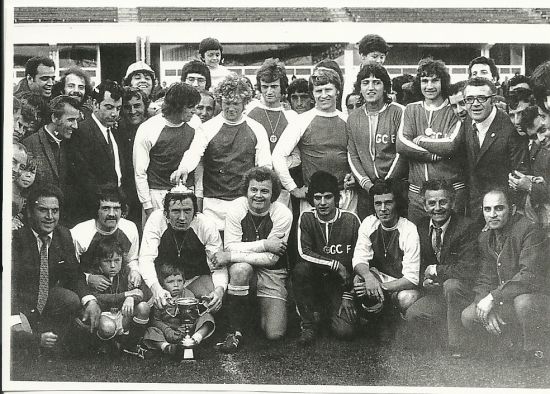 The team did acheive some glory by winning the 1974 Ampol Cup and State League Cup. This eased a little bit of the frustrations, but finishing second so many times disappointed many of the club’s faithful, as during this period George Cross had some of the best players in this country. The likes of John Gardiner, Kevin Walker, Frank McArdle, Norm Maitland, Paul Murphy, Derek Ricks, Dario Epifano, Tommy Clarke, Kevin Kelly and Lothar Kastner graced George Cross at the time, but even these players could not break the ice of winning a league title. 1975 saw a mediocre performance in the league with the team falling out of the championship race very early to finish in 6th place. And there was to be no cup success either that season. The beginning of the 1976 season had George Cross red hot favourites for relegation, with team morale sinking to an all time low after losing the opening 4 games of the season. The team failed to score a goal having conceded 12 and was stone motherless last. The concerned committee had been negotiating with former
The team did acheive some glory by winning the 1974 Ampol Cup and State League Cup. This eased a little bit of the frustrations, but finishing second so many times disappointed many of the club’s faithful, as during this period George Cross had some of the best players in this country. The likes of John Gardiner, Kevin Walker, Frank McArdle, Norm Maitland, Paul Murphy, Derek Ricks, Dario Epifano, Tommy Clarke, Kevin Kelly and Lothar Kastner graced George Cross at the time, but even these players could not break the ice of winning a league title. 1975 saw a mediocre performance in the league with the team falling out of the championship race very early to finish in 6th place. And there was to be no cup success either that season. The beginning of the 1976 season had George Cross red hot favourites for relegation, with team morale sinking to an all time low after losing the opening 4 games of the season. The team failed to score a goal having conceded 12 and was stone motherless last. The concerned committee had been negotiating with former
PROMINENT PLAYERS 1968-1976.
BILLY WILKINSON, KEN WAGSTAFF, ROBERT CULLEN, KEVIN WALKER, DEREK BARRON, JOHN WEBB, NORM NAITLAND, DEREK RICKS, KEN REED, PAUL MURPHY, TOM FOX, JOHN GARDINER, KEVIN KELLY, JOE CUNNINGHAM, DARIO EPIFANO, FRANK McARDLE, JOHN SANCHEZ, JIM PAPARAS, PHILIP CUTAJAR, JOHN WEBB.
THE FOURTH DECADE
1977 – 1986
AMALGAMATION, A HOME,
AND FINALLY A CHAMPIONSHIP.
This decade began with a bang for the Georgie faithful after years of waiting for that elusive championship. Even though he had left the club, the legacy of Ken Wagstaff remained. His appointed successor Billy Wilkinson continued building on what was achieved in 1976. The 1977 season saw the departure of Mooroolbark, J.U.S.T., 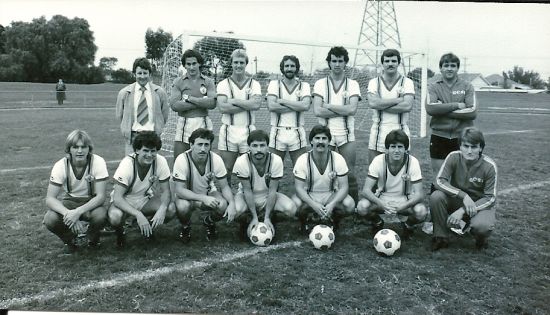 During the off season talks between
During the off season talks between
4th place, 1 point behind the leader. It was back down the lower rungs the following season, as the Georgies trailed every other team for most of the campaign. The never say die attitude saw the team slowly but surely haul back the gap to eventual-
THE FIRST SUNSHINE GEORGE CROSS TEAM IN 1983. ly overtake Heidelberg and avoid relegation by 2 points. It was a Harry Houdini escape act the way the Cross survived that season and one that had supporters biting their finger nails down to the skin. Under the guidance of wily coach John Gardiner, the Georgies played to their strength and were always competitive. At times it wasn’t pretty football, but getting points is what the game is all about. Whilst the senior team struggled in most seasons in the National League, the Youth side was doing the club proud by winning the Southern Division championship in 1986 and 1987. The club was constantly producing top talent that few clubs in
PROMINENT PLAYERS 1977-1986.
STEVE RICHARDSON, JEFF FAULKNER, NOEL MITTEN, SHAUN PARTON SEASON KEOGH, JOHN MARKOVSKI, TYRONE JAMES, CHRIS TAYLOR, DON McLAREN, JOHN CAMPELJ, OSSIE LATIF, ANDREW MARTH, CARL GILDER, GED BANNON, DAVID RIGBY, ROGER BAIN, PAUL TRIMBOLI, JOHN WADDELL, GARY CLARKE, GARY HASLER,CHRIS KETSAKIDIS, FRANK TALIA, PAT MORLEY, PAUL LEWIS, LES CARTER, LORENZ KINDTNER, KEVIN MUSCAT.
THE FIFTH DACADE
1987 – 1996
BACK TO VICTORIAN FOOTBALL
The start to the 1987 N.S.L. season was nothing short of disastrous with the team getting only 2 points in the first 11 games of the season. Anchored in last place, the Georgies looked doomed until a hat-trick by Paul Trimboli gave the S.G.C. their first win of the season over South Melbourne Hellas. The fight to avoid last place was against 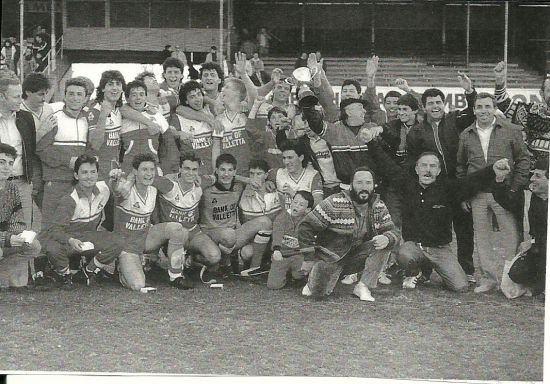 The youth team continued to roll along the road of success by winning the fourth Southern Division Youth championship. The youngsters crowned the season by finally winning the big one by defeating Marconi 3-2 in the final of the National Australian Championship. This was Gradiner’s last season in charge with Ernie Merrick taking over for the first summer league that got under way in 1989-90. The first match for the Cross was in
The youth team continued to roll along the road of success by winning the fourth Southern Division Youth championship. The youngsters crowned the season by finally winning the big one by defeating Marconi 3-2 in the final of the National Australian Championship. This was Gradiner’s last season in charge with Ernie Merrick taking over for the first summer league that got under way in 1989-90. The first match for the Cross was in
THE 1989 NATIONAL YOUTH TEAM CHAMPIONS
The bottom bottom dropped out for the Cross in the second half of the season following the sacking of
PROMINENT PLAYERS 1987-1996.
ROBERT FERLA, JOHN KANESOULIS, STEVE WARDLE, ANTHONY CASSAR, CHRIS DAGLARAS, CRAIG LEWIS, JOE DEBONO, SPENCER FIELD, JAMIE MELROSE, BILLY MAKRIS, JOHN MARKOVSKI, MICHAEL UTTING, STEVE MANGOS, AGIM SHERIFOVSKI, PETER COCKER, BRIAN ROBERTS, LUCIANO FABRIZIO, DAMIEN MORI, DAVID CLARKSON, CRAIG FOSTER.
THE SIXTH DECADE
1997 – 2006
CHAPLIN RESERVE BOUGHT
Big things were expected for the 50th anniversary season, but unfortunately the team assembled in 1997 was mediocre at best. The club made their biggest signing ever when Sunshine George Cross bought Chaplin Reserve from the State Government. Club officials made it official by signing the deal at the club's 50th Anniversary Dinner Ball held at the Lakeside Banquet & Convention Centre on Saturday June 28 1997. Two coaching changes during the season did not help with Vassallo being replaced by Robert Ferla and not long after he was replaced by Gus McLeod. The best win in 1997 was a 6-0 drubbing of 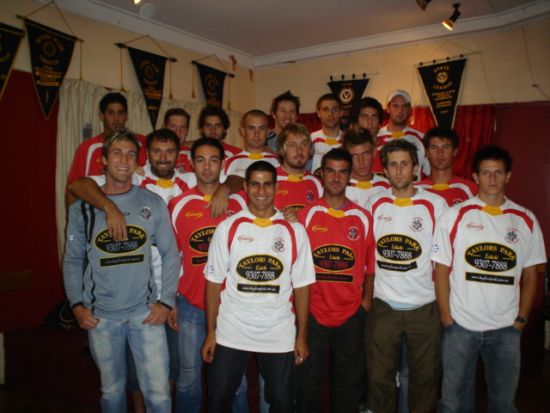 The following season the team was yet again involved in another championship challenge. This time it was Heidelberg United who went neck and neck with the Georgies all season long.
The following season the team was yet again involved in another championship challenge. This time it was Heidelberg United who went neck and neck with the Georgies all season long.
2006 SQUAD
PROMINENT PLAYERS 1997-2006.
EDUARDO SOARES, JUAN NILO, COLIN AZZOPARDI, COLIN JOHN, DUSKO DELIC, BRETT GILMOUR, VASKO TRPCEVSKI, ANOTHONY MAGNACCA, PETER SPITERI, MANNY MUSCAT, TONY NECESKI, TRENT WATERSON, GEORGE GEORGADIS, ILIJA DRAGICEVIC, JANI SURIC, MARK RECCHIA, MAHJOUB TAOULI, ALFONSO OPAZO, SASO MARKOVSKI, ROBERT KRAJACIC, BRANDON VASSALLO, ARTHUR TSIRTSAKIS.
THE SEVENTH DECADE
2007 - 2011
SALE OF GROUND
The 2007 season was the club's 60th anniversary season and plans to make this a memorable year quickly disappeared with the team struggling throughout the campaign. The F.F.V. informed clubs, four teams would be relegated at the end of that season and the Georgies occupied third last place in the 16 team competition at the end of 26 rounds of football. The committee wasted no time in appointing Andy O’Dell coach for the 2008 season. The English coach introduced a number of English players into the team that resulted in Sunshine George Cross winning the championship by 3 points from Dandenong Thunder. The return to the V.P.L. in 2009 saw a very competitive team that accumulated 32 points to finish in 8th place. The defence was very sound conceding only 18 goals, but the attack was equally poor scoring a measly 18 goals. Off the field President Charles Borg called it a day with Darren Farrugia taking over the role as President. The 2010 season began brightly enough with the team sitting just outside the top 4 half way through the season. Things began to sour when players began to leave the club that culminated with coach Andy O’Dell also quitting his post after the huge 6-0 loss to Altona Magic. Sunshine George Cross slipped from 5th to last place, following 9 successive defeats. Former assistant coach Theo Constantinou was given the task of motivating the players in the remaining games, but just failed, with the team finishing in last place. It was close with the relegation issue was not being settled until the final day when the Georgies lost 4-0 to South Melbourne and Bentleigh Greens upset the league leaders 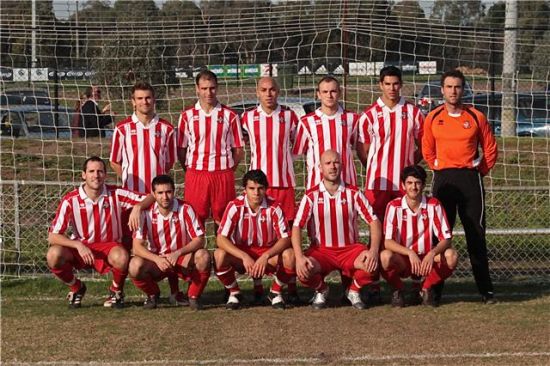 The high expense of playing at this venue and the issue of having to play matches on a Monday night, ate into the club’s finances, but the committee was still able to improve the club’s financial position from 12 month’s prior to coming into office. The big acheivement during the course of the year was the club being granting its rightful name, after many years of being ignored by the Federation on this very important matter. The F.F.V. notified the club on the 11th of May 2010, the club's official name from this day onwards will be, Sunshine George Cross Football Club. The days of being referred to as Sunshine Georgies was over for good. This brought to an end the long battle against the F.F.V. that began in 1995. Dogged perseverance finally paid dividends on a matter so important to all who follow this club. There is no doubt the team will continue to have its ups and downs, but the future of Sunshine George Cross is very bright considering the articulate planning now taking place as to where the club is heading. A long term plan has been put in place that will ensure Sunshine George Cross will be around for a long time. The process of selling the land is close to fruition and prospects for the club have never looked better. From here on the SUN will surely SHINE on the GEORGE CROSS FOOTBALL CLUB
The high expense of playing at this venue and the issue of having to play matches on a Monday night, ate into the club’s finances, but the committee was still able to improve the club’s financial position from 12 month’s prior to coming into office. The big acheivement during the course of the year was the club being granting its rightful name, after many years of being ignored by the Federation on this very important matter. The F.F.V. notified the club on the 11th of May 2010, the club's official name from this day onwards will be, Sunshine George Cross Football Club. The days of being referred to as Sunshine Georgies was over for good. This brought to an end the long battle against the F.F.V. that began in 1995. Dogged perseverance finally paid dividends on a matter so important to all who follow this club. There is no doubt the team will continue to have its ups and downs, but the future of Sunshine George Cross is very bright considering the articulate planning now taking place as to where the club is heading. A long term plan has been put in place that will ensure Sunshine George Cross will be around for a long time. The process of selling the land is close to fruition and prospects for the club have never looked better. From here on the SUN will surely SHINE on the GEORGE CROSS FOOTBALL CLUB
2010 SUNSHINE GEORGE CROSS V.P.L. TEAM
TO BE CONTINUED AS THE YEARS ROLL ON.
LONG LIVE SUNSHINE GEORGE CROSS FOOTBALL CLUB!
Compiled by club historian Victor Brincat












